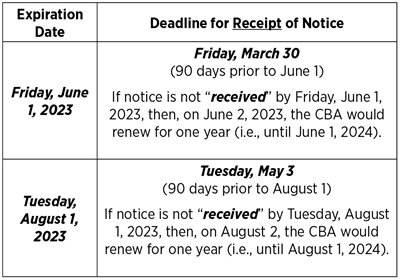
Grant Collins
For contractors with collective bargaining agreements (CBAs) expiring in 2023, it is important to remember that most CBAs, including the Standard Form, include an “evergreen” or “automatic renewal” clause. The clause provides that the CBA will be automatically renewed (usually from year to year) unless one party gives notice (usually more than 60 or 90 days) prior to the contract expiration date of its intent to terminate the contract and/or reopen the contract in order to renegotiate a new agreement.
Automatic Renewal Clauses
At the outset, it is important to note that the language used in automatic renewal clauses varies. Whether the notice is sufficient to prevent the automatic renewal will depend on the specific language used in the contract.
For example, Article XVII, Section 1 of the Standard Form provides as follows:
This Agreement and Addenda . . . shall become effective on the day of ____ [month], _____ [year] and remain in full force and effect until the day of ____ [month], _____ [year] and shall continue in force from year to year thereafter unless written notice of reopening is given not less than ninety (90) days prior to the expiration date.
This means that the party intending to reopen the CBA must provide the other party with “written notice” of such intent at least 90 days prior to expiration. If neither party gives notice, then the current contract “renews” (or rolls over) for one year.
“Date of Receipt” Is Key
Importantly, the timeliness of such notices is governed by the “date of receipt” and not the “date of mailing.”1 While there may be an exception for an unanticipated delay that is beyond the control of the party, the Board has made clear that waiting to the last minute to mail the notice is not a valid excuse.
Calculating the Deadline
To calculate the deadline, count backwards from the last day that the CBA remains in effect (called the “termination day”). Be sure to include the last day (or “termination day”) in your calculation.
Consider the following examples if the CBA contains the same 90-day notice period required by Article XVII, Section 1 of the Standard Form:
 What Happens If No Notice Is Provided?
What Happens If No Notice Is Provided?
If neither party provides the required notice (or if the notice is untimely), then the CBA’s term is extended for the term specified in the clause. For example, Article XVII, Section 1 of the Standard Form provides that the CBA is renewed for a period of one year.
If a CBA is automatically renewed, there would be no changes to the agreement. Thus, there would be no increases (or decreases) in any of the wages, benefits or other terms and conditions set forth in the renewed agreement. The no-strike clause would also continue to apply until the renewal term expires.
The parties can mutually agree to “reopen” the renewed contract prior to expiration of the renewed term. But unless the CBA includes Article X, Section 8, if the parties agree to formally “reopen” the contract, then the union would have the ability to go on strike if the parties fail to reach an agreement. Thus, rather than formally “reopen” a renewed contract, a contractor could instead only agree to “discuss” certain items, such as a wage increase, during the term of a closed contract.
As you can see, there are a number of legal and practical considerations when dealing with a missed deadline and a potentially renewed agreement. Thus, if there is any doubt regarding whether the deadline was missed, the contractor should reach out to SMACNA’s labor relations department to discuss the issue and determine how to best proceed.
Grant Collins is an MSBA-certified specialist in both traditional labor law and employment law at Felhaber Larson. Grant’s traditional labor practice involves preparing for and serving as chief spokesperson for collective bargaining, advising employers on their rights and obligations under collective bargaining agreements and the National Labor Relations Act (NLRA) and representing employers in grievance arbitrations and unfair labor practice charges before the National Labor Relations Board. Reach him at gcollins@felhaber.com or through www.felhaber.com.